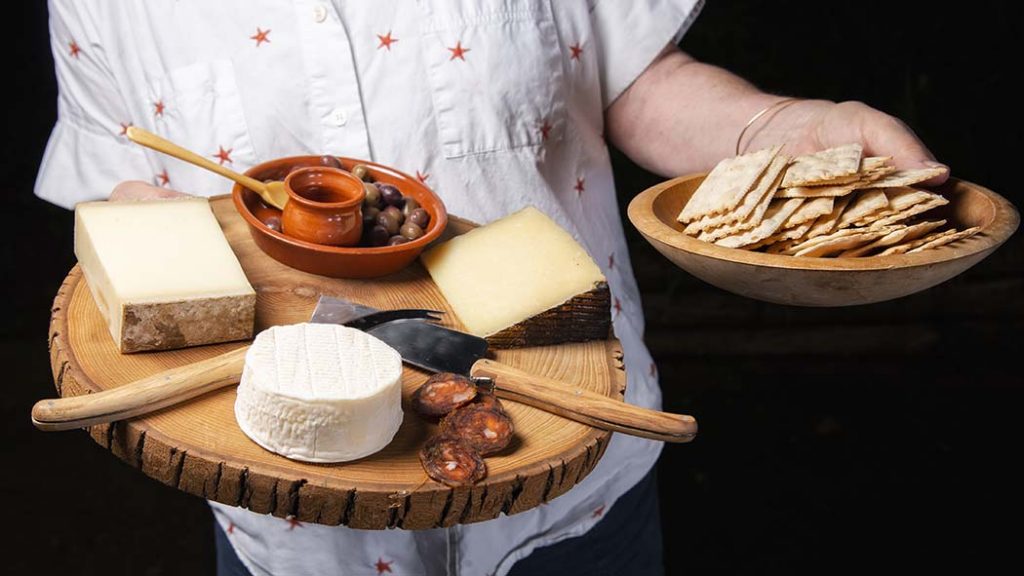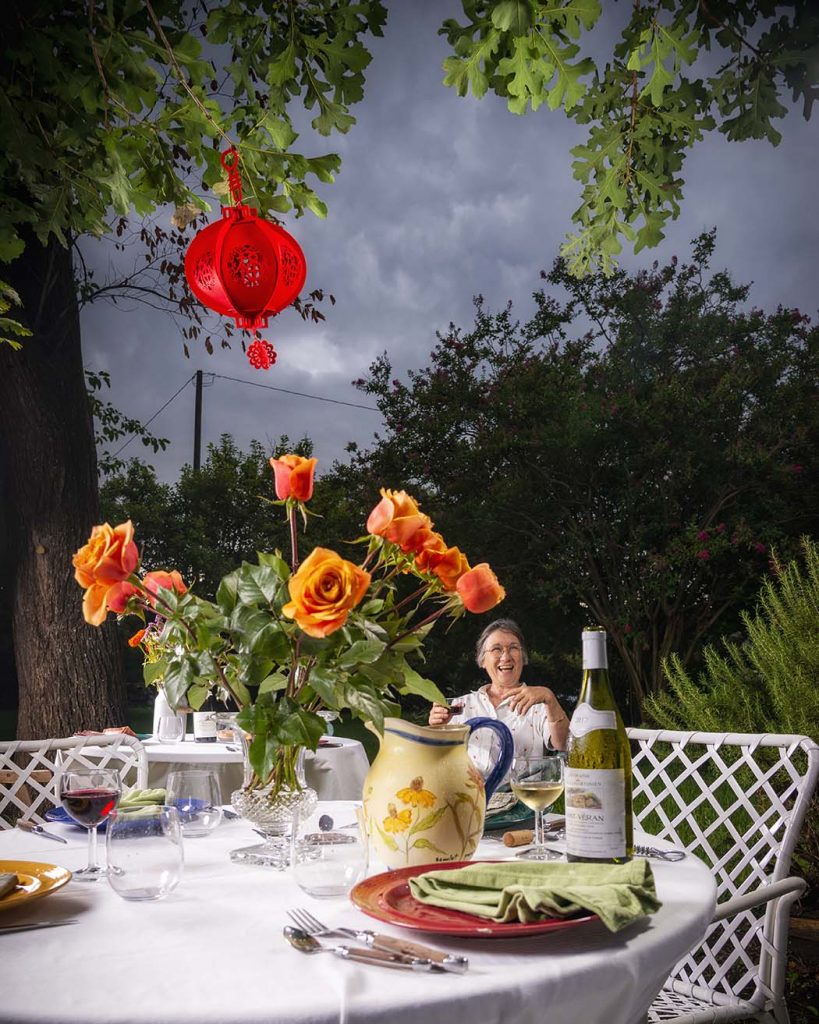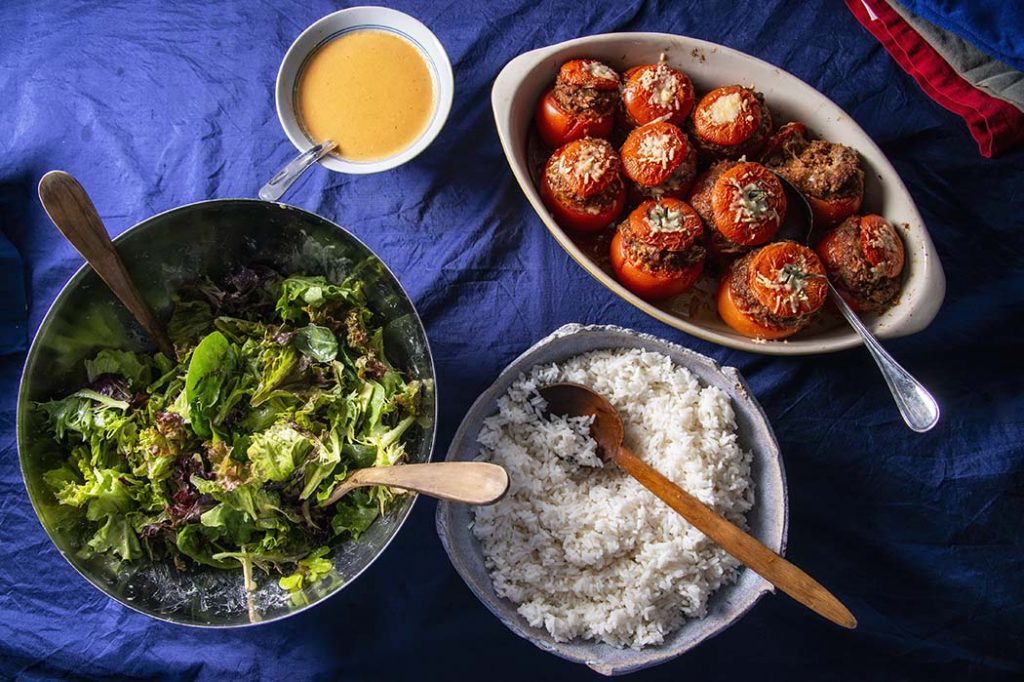
Photography by Danny Fulgencio
Imagine moving to Texas in 1977 from your hometown in the Burgundy region of France.
This was not a foodie paradise at the time. Bread was white. Lettuce was iceberg. Cheese was Kraft Singles. Lancers was wine. That’s the culinary climate that Pierrette Lacour walked into when she arrived in Dallas from Dijon on Jan. 2 that year.
After more than 40 years here, including 17 years throwing dinner parties on her Oak Cliff front lawn, Lacour is selling her tiny house on North Clinton Avenue. She’s moving back to her hometown, where she bought an 18th-century house near her sister.
Oak Cliff may never be the same.
Her legendary dinner parties started when an artist friend fell into depression and stopped eating. They had a standing Tuesday dinner, which turned into a salon with artists, writers and academics sharing food, friendship and ideas.
Even in a 600-square-foot house with a tiny kitchen, cooking for nine or 10 guests was never a problem.

“What I see is that Americans, they are afraid of cooking,” Lacour says.
Nothing she makes is complicated, she says.
Lacour married an American and moved to Austin, where she found two people selling groceries — the good stuff, including real wine and cheese — out of their garage. They turned out to be the founders of Whole Foods.
She rang up cross-continental phone bills calling her grandmother in Dijon, who talked Lacour through all of her own classic recipes. Whenever Lacour asked how to cook something, her grandmother would say, “Oh! It’s very easy!”
Lacour cooks every night, and she says she rarely takes more than 20 minutes to make dinner.
Here’s how she does it.
Choose a grocery store that has high-quality ingredients. If the components taste good, the dish will taste good. Lacour’s go-to stores are Cox Farms Market and Aldi. Her daughter, Jean-Marie Browning, makes the trek to Central Market for things like French butter and better cuts of meat. Smaller produce often has better flavor, she says, so don’t go for the biggest onion or eggplant.
Let produce inspire you. When tomatoes are in season, she puts them in everything. In the fall, she uses a lot of cauliflower.“Whatever I see will guide me for what I am going to cook,” Lacour says.
Season chicken, pork and beef with the “French trinity” of salt, pepper and herbes de Provence. Here’s how she cooks pork loin: Stick thin slices of garlic into slits cut all over the loin, and rub the whole thing with good mustard. Heat olive oil in a deep pan and sear the meat on all sides. Slice half an onion and add it to the pan, along with about of an inch of liquid — water, wine or broth. Turn down the heat. Slice three small tomatoes and add those. Cover and cook until the meat’s internal temperature reaches 145 degrees.
Lacour’s dinners always start with salad in summer and vegetable soup in cold months. Wash lettuce as soon as it comes home from the grocery store so it’s ready for salads. Lacour makes mustard vinaigrette and keeps it in a jar in the fridge.
When things take longer to cook, make large quantities. Browning fixes 5-pound batches of Bolognese sauce, then divides it into portions to freeze. Lacour will make ratatouille for a main course and then serve the leftovers later in the week mixed with quinoa or pasta.

Keep a well-stocked pantry. Lacour always has mustard, olive and sunflower oils, dried pasta, tomato paste and heavy whipping cream to make sauces.
A good baguette can be hard to find, but Lacour and Browning like the Italian-style loaf from Trader Joe’s frozen section.
Lacour always serves fruit for dessert, but she also makes at least one French pound cake, called a quatre quart, every week. If you ask for the recipe, she will give you the measurements in grams — she uses a scale to weigh the ingredients. It’s the French way.
Hosting dinner parties comes naturally to Lacour. She even likes washing the dishes by hand afterward to meditate on the evening. “My religion is cooking,” she says. “Breaking bread with friends.”
When cooking for company, always make something that you’ve done before, something that makes you happy to cook, she says. One of her tricks is to delay serving the food to make sure that everyone is very hungry when it’s served. Everything tastes better that way.
The most important thing is to relax, she says. It’s just dinner. “You’re not doing it to impress people,” she says. “You’re doing it because you’re sharing.”





